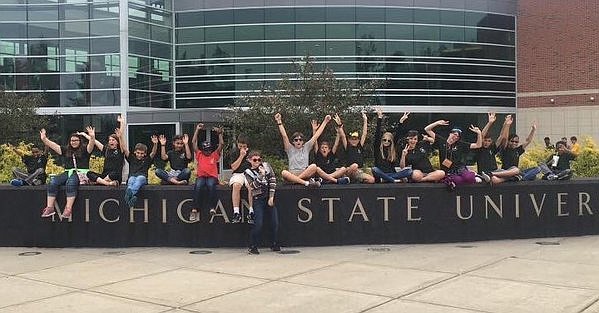- January 17, 2025
-
-
Loading

Loading

The luggage was heavier when the Future Problem Solving teams from Flagler County boarded their plane in Michigan to return to Florida. The cause of the extra weight? All those trophies.
Nearly 60 students from Flagler Palm Coast High School, Bunnell Elementary School, Rymfire Elementary School, and Indian Trails Middle School traveled to Michigan State University in East Lansing, Michigan, joining teams from 11 countries.
Flagler students made their presence known during the opening ceremonies, when FPC’s own Savannah Umpenhour was chosen to be the flag bearer for the United States. Umpenhour had previously been announced as a semi-finalist for the “Creating the Future” scholarship.
The keynote speaker of the opening ceremony was 2007 Flagler Palm Coast High School graduate, and former FPS competitor, Alec Manfre. He spoke to the international crowd about his FPS experience, and how it has helped him start his own successful energy sector business.
School Board member Andy Dance was one of the adults who attended the competition.
“It gives the students a taste of college life,” Dance said. “They competed against countries from around the world — Turkey, Singapore, Australia and the Philippines. Two of the most prominent states, after Florida, were Kentucky and Texas. They both have intensive programs, and Texas has a paid FPS position in their department of education.”
The FPS program is broken down into various competitions. In Team Global Issues, teams of four students were given a scenario in an imagined future. The teams had two hours to find potential problems in the future scene and solve them. The Individual Global Issues competition is similar except with only one student.
In the Multi-Affiliate Global Issues Competition, (MAGIC), alternates from a school’s team are placed with others they haven't worked with, to work on the Team Global Issues.
The Scenario Writing Competition had students write a short story, set 20 years in the future. The scenarios had to be less than 1,500 words and based on a competition topic. These were written before the event and mailed in for evaluation.
Scenario Performance competitors created a 45-minute story, set at least 20 years in the future, based on one of the Scenario Writing topics for that year. Students couldn't use any props, aids or notes.
Community Problem Solving (CmPS) encourages students to find and solve problems within their own community using the FPS process. At Internationals, the teams had 3 1⁄2 hours to make a board highlighting their project, followed by a half-hour judge's interview.
“We always want to push them to exceed, beyond what even they believe they can do,” Dance said.